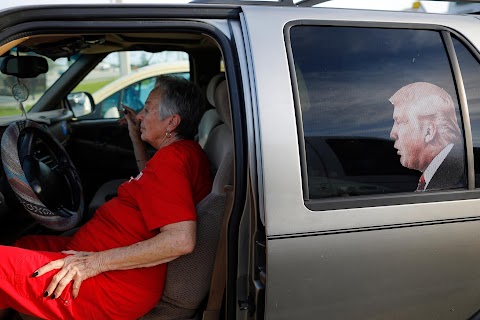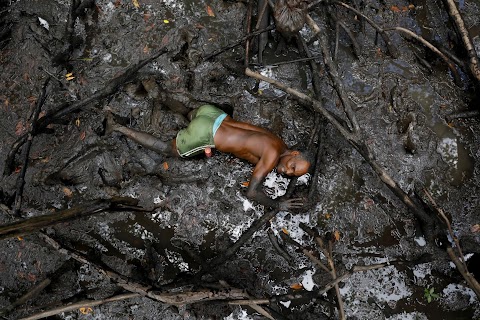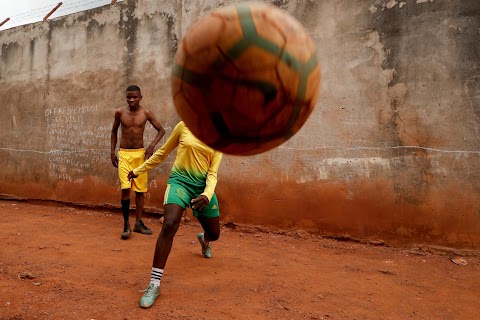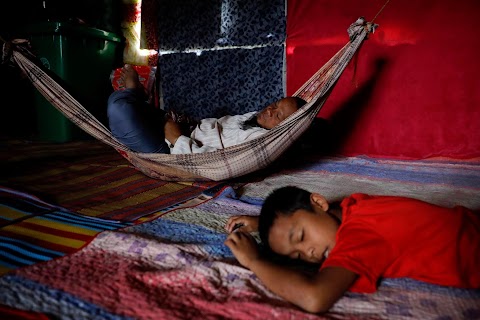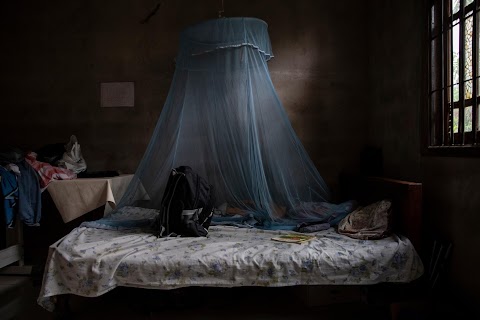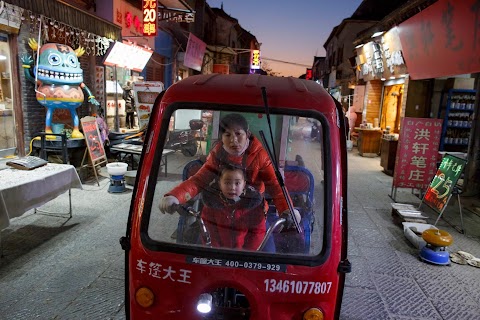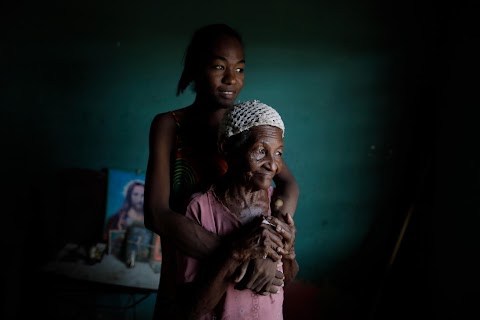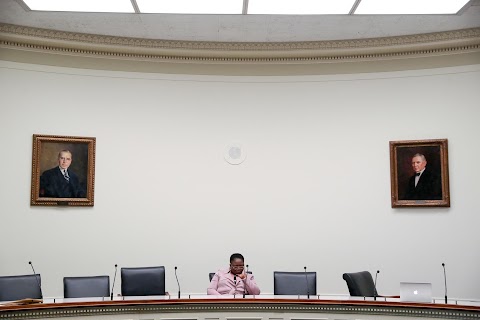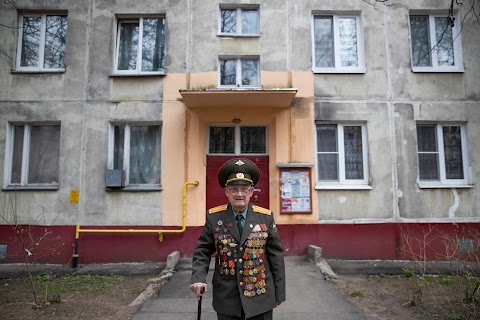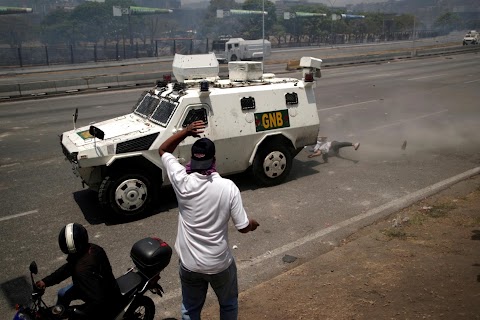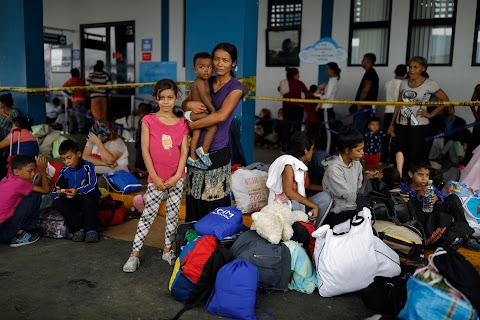
Venezuelan mothers, children in tow, rush to migrate
Mothers dragged their children across three countries, trekking around border checkpoints and crossing rivers in waist-high water. Others were conned by fake travel agents, or robbed by bandits.
They breastfed in immigration lines, tended to fevers in parking lots, and stroked the tiny hands of their children on bus rides into the unknown.
Venezuelan women arrived in unprecedented numbers at Peru's border this past weekend, according to the UN Refugee Agency UNHCR - part of a rush across South America by tens of thousands of Venezuelan migrants after Peru announced it would tighten entry requirements in June.

"It's as if we were all blind, wandering here together," Erika Quevedo, 28, said of her 8-day trip from her hometown of Barquisimeto in Venezuela with her two children and her mother.
Like many of the dozens of Venezuelan women interviewed by Reuters at Peru's northern border city of Tumbes, Quevedo said she paid guides in Colombia to help her family make the trip, only to find they disappeared with their money.
With little cash left, she survived the rest of the trip by banding together with other single mothers she met on the way.
"I don't know what I would have done without them," Quevedo said of her female travelmates as they hustled with their kids toward Peru's border.

Men dominated the first waves of Venezuelan emigration, helping to build a diaspora from Bogota to Madrid that is now more than four million strong, according to the United Nations.
But Venezuela's deepening economic crisis is now dislodging some of the country's neediest. Many of the women, children and elderly they left behind now are rushing to catch up to family members in cities across South America and beyond.
Fueling the exodus are fading hopes for change in Venezuela, as the opposition's bold plans to unseat President Nicolas Maduro appear to have diminished.
At the same time, U.S. sanctions aimed at weakening Maduro are exacerbating the economic crisis, hitting the poor hardest.
"We can't survive on what they were sending anymore," said Rosalba Barrios, a 51-year-old mother of eight crossing the border with a daughter and two grandkids, on their way to join her adult children in Lima.
Barrios, a seamstress, described a family torn apart by dysfunction in Venezuela.
Within 18 months of each other, she lost her 28-year-old son in one of Caracas' frequent armed robberies and her 83-year-old mother to cancer due shortages of medicine.
"Emigrating isn't easy," Barrios said, crying as her family huddled together beneath the rain at the border checkpoint. "I never wanted to leave. Not me. It's not easy to say goodbye. To leave the life you know."

Tears came easily to the migrant mothers.
Marlioth Armas, 28, cried in frustration describing the constant shortages of basic goods in Venezuela.
"Milk! Shampoo! Nothing!" said Armas, cradling her daughter before continuing her trip to reunite with her husband in Lima. "I just want to live somewhere we can get things and be normal."
Many said they had been mulling a move for months, but had remained hopeful the crisis would abate. They mustered enthusiasm for Juan Guaido, Venezuela's opposition leader who invoked the constitution in January to assume the presidency, in a challenge to Maduro.

"I really was betting on Guaido. I was sure he was going to change the country," said Andraimi Laya, 22, her 2-year-old wiggling in her arms.
When Peru's President Martin Vizcarra announced Venezuelans must have passports and visas to enter Peru starting June 15, Laya dropped everything.
She put her dream of becoming a police officer on hold, sold her last valuable possession, her TV, and headed for Peru with her daughter.
"I said, 'no, I'm not going to die here. This might be my last chance.'"

Laya wasn't alone. Nearly 50,000 Venezuelans entered Peru in the past week, according to official figures - creating dayslong backlogs at the border at Tumbes. In previous months, between 1,500 and 2,000 a day had entered.
"This is a demonstration. This is Venezuela saying we don't want to be governed like that. We don't want that man as president," Margarita Sulbaran, a 55-year-old mother of seven, said of Maduro.
But the mad rush to Peru's border in the past week was largely unnecessary. Peru only tightened entry requirements on Venezuelan migrants, leaving its policies regarding asylum-seekers unchanged.
The latest wave of migrants are arriving just as sentiment toward Venezuelans has soured.
But Quevedo said anything beats being a mother in Venezuela. When her son was born, prematurely, she couldn't summon an ambulance or a ride to the hospital.
"My son was born in my house and my mom was the midwife," Quevedo said. "If it weren't for my mom, my son wouldn't be here."
Slideshow

Nemesis Ramirez, 22, is travelling with her children Ailin, 6, and 5-month-old Raimar, to meet her husband who left Venezuela for Peru three months ago. "I hired a travel agency, and it was very bad. I would not recommend it to anyone. They left me four days in Cucuta, with the children sleeping on the floor," Ramirez said. "I cried and wanted to return, but my daughter told me that she wanted to continue, that she wanted to keep travelling to see her father. And if she was strong, I had to be stronger than her."

Suramay Farias, 47, had never thought about travelling, much less leaving the country, but worried about the future of her youngest daughter, Franchesca, 8, she decided to go to Peru where her other children have been living for a year. "This is very hard because I left my mother, I left my husband, but I also have my children here. This is not what I wanted. I would like to have my children in Venezuela". "I love my country, but with the circumstance that we have there, we have to migrate."

Arlene Gerder, 38, left Venezuela for first time seven months ago looking for a better future for her children Jose, 4, and Dayana, 14. She is on her way back to Peru after picking up her children from Venezuela. "In Venezuela, my children were not eating well. My daughter, thank God, was studying in a private school that I paid for from (Peru), but my son wasn't. He was in a state school, he is four years old and when I returned, he did not even know the colours." "My children may suffer, but here they will suffer with a full stomach."

Iris Mejias, 68, a nurse with more than 40 years of professional experience, was diagnosed with cancer a few months after her daughter and son-in-law left Venezuela to go to work in Peru, leaving their children under her care. "After having surgery, I have not been able to get chemotherapy because we do not have access to medicines." "I'm travelling to bring Victoria to her mother because how would a ten-year-old girl cope when her grandmother, who has been like her mother, dies and suddenly she has no one. How could I leave this girl in limbo?". "I am forced to leave. I have no alternative." Victoria's two older siblings stayed in Venezuela and are completing their studies.

Elizabeth Rondon, 28, from Maracaibo, is travelling with her children Luis, 5, Samantha, 2 and Samuel, four months old. With tears running down her face, she said, "One of the toughest things (in Venezuela), was not being able to sleep. As a parent, you are so tired from all you do during the day. To take care of the children, wash their clothes, find food, and have to deal with a power cut at night knowing that it will last at least 12 hours. That's ugly. But it wasn't only one a day. It has been like that in March, April, May, and June until I left, almost every day it was the same." "I want my children to dream in big; I would like them to want to be doctors, engineers, or architects." "I would like to go back to Venezuela, but I would like to see it as I remember it."

Juviamdy Garcia, 19, a paramedic, is travelling with her son Luian, 2, to reunite with her husband in Peru for a year. "We arrived in San Antonio (in Venezuela) on Monday, and (the guide) helped us cross (the border) using the pathways. When we got to the other side, the Colombian police stopped us and made us return." "I only have $20 left to get to where I'm going, I have to go to Lima, but I don't know how far I can get," Garcia said. "I want to be in my country, my dream is to be a doctor, I studied at the university, but I had to leave because I got pregnant and also because I had a terrible experience. I was in a classroom, and suddenly some men entered with guns, and robbed us all, they (assaulted) a woman classmate." "I said to my mother, I didn't want to go there anymore."

Genesis Valera, 27, who is six months pregnant, is travelling with her children Sebastian, 7, Claudia, 6, and Isaias, 2. "I was waiting for a guide, my mobile phone ran out of battery, and I kept waiting in San Antonio (in Venezuela) for a while, but that area didn't have electricity. At some point, people arrived and told me, come, come, you will cross (the border) through the pathways," Valera said. "We walked along the pathways with the children... I went through the water, they told me to shut up because the guerrillas were around." Once in Colombia, Genesis travelled by bus but had to get off an walk part of the way to avoid a checkpoint. "We had to wait in the middle of the bushes for two hours, it was dark and very cold, while we waited for the bus to pick us up again."

Erika Fernandez, 33, a nurse, is travelling with her sons Ronald, 10, Jose, 3, to meet her husband who has been in Peru for one year. "Everything has been terrible since I left my house and it is still a nightmare." "My child has been vomiting since last night, I took him to the Red Cross, and they gave me water to rehydrate him and paracetamol in case he gets a fever." "The toughest part has been to see my children go hungry because I never thought I would see my children like that. That they say to me, 'Mama I'm hungry', and I don't have money to give them anything." "I want a better quality of life for my kids, I do not want to teach them that they have to fight for food, I want to teach them that anyone who works, can buy it."

Ailin Tua, 43, is travelling with her daughters Paola, 18, and Sofia, 13. Tua's husband was a truck driver and had a good income. "He killed himself for more than 28 years... on Venezuela's highways, thank God, who took care of him for such long time while working to support us and support his family." "The owner of the company where he worked migrated to the United States and the business closed." In 2017 her husband left the country, first to Ecuador and then to Peru, but it was not until after six months later that he managed to get a stable job and was able to send money back. The final trigger to leave was a kidnap threat, "I received a call and they said: 'Ahilin, I want $350 right now or I'll go to kidnap Paola and Sofia, I will go to their schools.'" "I stopped a taxi, and I went to their schools to pick them up quickly, then we went home, and packed what we could carry in two black trash bags... and ran to my sisters' house." Tua left her daughters living with her sister in another town and migrated to try and establish a new home, before going back to Venezuela to collect her daughters.

Teresa Amaro, 83, her daughter Maite Perez, 43, and her grandson Edwar Coste, 7, rest at the at the Ecuadorian-Peruvian border service center before they continue their journey into Peru. Amaro, who had previously suffered a heart attack, said: "It is tough to find medicines, and when you find them they are very expensive, and there is not enough money to buy them. We didn't have electricity. We didn't have cooking gas and we were cooking with firewood. By the time we left, we already had a month without gas in the area, and we couldn't find firewood either. I did not want to come, but they told me: 'Mama, we're not going to leave you alone.'"
